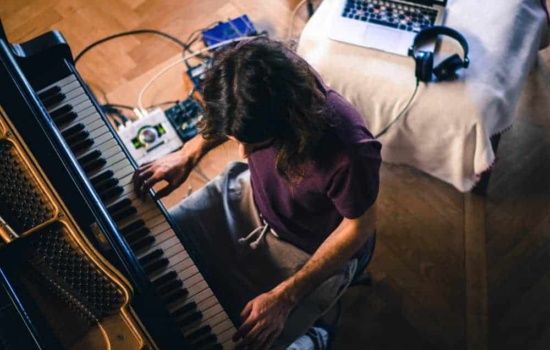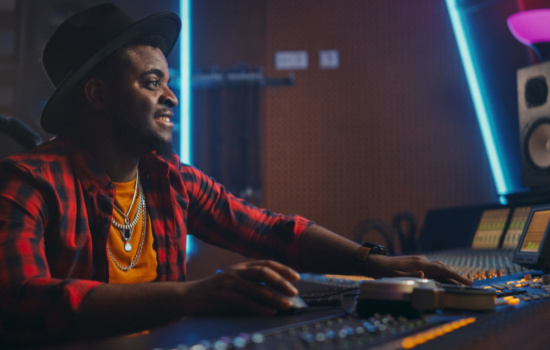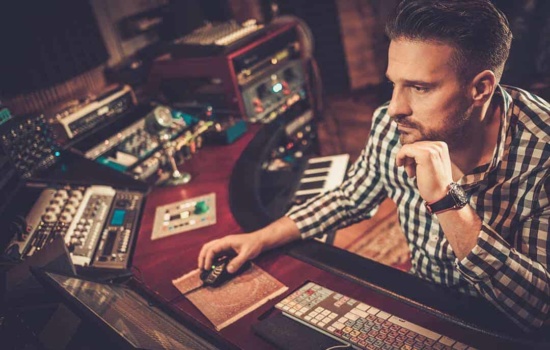Music Career Finder
Survey Start
Composer

How To Become a Composer
- A composer writes instrumental music for orchestras to perform, artist recordings, films, ads, and video games
- Composers are self-employed and often work outside of the typical 9-5 workday
- A composer usually charges a per-project fee but can also earn performance royalties
- A career as a composer can be stressful, with quick turnaround times and plenty of feedback and criticism
- Composers earn an average of about $53,300 per year, but this varies greatly among composers
- Career Description
- Salary
- Career Outlook
- Career Path
- Experience & Skills
- Education & Training
- Additional Resources
- Sources
- References
Career Description
Composers write instrumental, often orchestral, music for orchestras to perform, artist recordings, films, ads, video games, and any other type of visual media.
What Does a Composer Do?
There are many kinds of composers, so they have different responsibilities depending on their job situation.
Classical composers write music for orchestras to perform live.
Film composers write music for films, TV, and advertising.
And some composers write music for video games.
In each case, a composer writes music typically for orchestral instruments to play, like cello, violin, brass, woodwinds, and percussion.
This involves sitting down with their instrument, or at their digital audio workstation (DAW) and a MIDI controller, to write instrumental music.
A Day In the Life of a Composer
Phil Servati, composer for film and advertisement, said his schedule is different depending on the project.
When composing for a feature-length film, he said he’s “writing all the time. [I] wake up, I have my coffee, and [I] get to it. …It’s a pretty intense schedule.”
He said in the commercial/ad space, work can go from full speed to a complete stop.
“It’s like pedal-to-the-metal and then all of a sudden, you just slam on the brakes and you don’t really do much until you hear feedback from the client,” he said.
Film composer Jacob Yoffee said he works 60 hours a week, which equates to 10-12 hour workdays.
The takeaway is, you set your own schedule as a composer, but you may end up working outside of the typical 9-5 work schedule.
Music Composer vs. Songwriter
A composer and a songwriter have slightly different roles.
A composer typically writes instrumental, orchestral music and often works on larger-scale projects, like films, TV shows, video games, and ads.
On the other hand, a songwriter writes songs with lyrics and melodies.
There can be overlap though. A songwriter might compose orchestral-style music to their lyrics. And a composer could try their hand at writing lyrics to be sung over their music beds.
Salary
Composers earn an average of about $53,300 per year.
The annual income for composers runs from $20,000 to $115,000, so there’s a lot of variation from composer to composer.
“You won’t be making a living” in the beginning, said Yoffee. He said starting out, you may only make less than $5,000 a year.
“This is possible because so many people are willing to work for free,” he said.
But if you stick with it, you can, like many others, turn composing into your career.
Who Do Composers Work For?
Composers are almost always self-employed, so you’ll end up having multiple clients.
These clients can include:
- Brands who need music for their ads
- Independent filmmakers
- Video game creators
- An orchestra, ensemble, or chamber group that needs music
- Theater company that needs music for their performances
How Do Composers Make Money?
Here’s how composers earn money:
- Per project fee (most common)
- By the page (of sheet music)
- By the minute (of music produced)
- Residuals (royalties) on recordings or performances of their works
Because composers are almost always freelancers, they set their own rates.
This means for a per-project fee, you’ll have to estimate how much time you’ll spend composing, re-writing, editing, and recording, then decide what fee you think is fair for your time and expertise.
Hey, what do you think about trying our new Music Career HelperMusic Career Helper really quick? It’s totally free and could help get your career moving fast! Give it a try. It’s totally free and you have nothing to lose.
Career Outlook
As long as there’s a need for instrumental, orchestral music, there will be a need for composers.
You have to be willing to take feedback and make changes to your composition, especially if you’re working for a client who needs a composition to fit their visual media.
Producers and directors may decide to cut or rearrange scenes, or the music editor may decide they want an already released song in one scene instead of your score.
It can be a difficult field to get into.
“It is nearly a million-to-one odds,” Yoffee said of making a career in composing. But “prospects are a bit higher now because people are making films independently of studios.”
But if you love composing and can collaborate well with others, this could be a good career for you.
The Effect of Artificial Intelligence on Composers
Servati said he doesn’t use any AI to help him compose, but he could see how it may speed up the process.
He said AI’s effect on composers is “a question mark at this point.”
“There’s so much in this online world that is still being worked out in terms of copyright and the legalities and all that,” he said.
He compared the advancement of AI in music to the 1970s and 80s when people were worried about synthesizers replacing orchestras, and how that didn’t happen.
“Each time we advance with this new technical idea or technology,” he said, “I think there are ways to use it to advance what we do and to hopefully streamline some of the things that…just take up time. If you can use and leverage AI to speed up the composition process, I think that’s probably a good thing.”
Career Path
Every successful composer will tell you about their lean early years.
Working for free on student projects to build a portfolio. Creating demo reels they can send to potential clients or to win commissions. Maybe entering works into competitions. Getting plenty of rejections. It comes with the territory.
Also, each composer has a different path to success, so there’s not one way to do this. But here are some tips to get you started…
Work On Your Craft
Yoffee said you have to be great at composing. This is where it all starts. Make sure potential clients can’t ignore you.
This includes:
- Understanding basic song structure
- Watching films and analyzing the music
- Figuring out what you offer that other composers don’t
- Watching YouTube tutorials on sample libraries and how to write to picture
Get the Right Tools
You’ll need a DAW, a MIDI controller, music-writing software, and instrument plugins.
Network
Because composers are freelancers, if you aren’t working, you aren’t getting paid, most of the time. Young composers will spend a lot of time and effort looking for work. It’s important to build and maintain a strong network of collaborators who will lead you to your next job.
Look Everywhere for Jobs
According to Yoffee, the best way to start your job search is by searching Craigslist postings, approaching directors, and working on student films.
He said you should “work with everyone. No matter how big, treat it as the dream gig you’ve always wanted. No matter who’s hiring you, you have to give 100%.”
Experience & Skills
So you want to pursue being a music composer?
Here are the main skills you’ll need to develop…
Music Composition
This one is obvious. You have to know the basics of music composition. And then you need to practice composing, even before you have any jobs.
Rescore
Rescoring a piece of visual media is when you mute the original soundtrack and compose your own music to fit. This will give you really good practice for when you do start getting this type of work.
Master Your Instrument
Yoffee says that the ability to play piano and guitar are “the greatest asset to any film composer,” with flute, saxophone, and clarinet also useful.
Learn To Produce, Mix, and Master
Your clients will want a professional-level track and they want it quickly. As Servati said, “they always want something yesterday.”
So learning how to record, mix, and master will help you streamline the process.
Be Adaptable
Because scenes are constantly being rearranged or cut and a composer must be adaptable, being a film composer “isn’t good for someone with a complete artist mentality,” who sees their work as “a masterpiece that can’t be changed,” says Yoffee.
Develop a Strong Work Ethic
Because you’ll be self-employed and probably working from your home studio, you’ll need to be a self-starter. No one will make you get up and work, but if you miss deadlines, you’ll lose clients.
Fall In Love With Film
“You need to love film…” Yoffee said. “If you’re a composer for film, you are a filmmaker.”
Education & Training
According to Yoffee, aspiring composers “need to understand the mechanics of music on the simplest level (like the structures of simple song form) and need to be able to put together 20-30 minutes of music quickly.”
Does this mean you should attend a university to earn a music degree? It depends.
Music Composer Degree
Yoffee and Servati both have a master’s degree in Scoring for Film and Multimedia.
On one hand, Yoffee recommends aspiring composers attend music school. But on the other, he said you won’t graduate with enough knowledge to immediately start working as a high-level composer.
Servati said the same thing, saying his degree didn’t “land me a job scoring film or writing music for a commercial or working with another musical artist.”
Because there are some things you’ll have to just learn hands-on.
However, schooling can be a great way to learn basic to advanced music composition skills.
Additional Resources
Performance Right Organizations (PROs)
As a composer, you can collect performance royalties, but you’ll need to register your songs with one of these PROs:
- American Society of Composers, Authors and Publishers (ASCAP)
- Broadcast Music, Inc. (BMI)
- Society of European Stage Authors and Composers (SESAC)
Support for Music Composers
- Production Music Association
- New Music USA
- Stage Directors and Choreographers Society
- The Dramatist Guild
- Society of Composers
- National Association of Record Industry Professionals (NARIP)
- Gamasutra
- Chamber Music America
Sources

John Buckley
Born in Templeglantine, Co. Limerick in 1951, John Buckley studied flute with Doris Keogh and composition with James Wilson at the Royal Irish Academy of Music. His subsequent composition studies were in Cardiff with the Welsh composer Alun Hoddinott and with John Cage.
He has written a diverse range of work, from solo instruments to full orchestra. The list includes numerous commissions, amongst them Concerto for Organ and Orchestra and Campane in Aria for the National Concert Hall, Rivers of Paradise for the official opening of the Concert Hall at the University of Limerick, Maynooth Te Deum for the bicentenary of St. Patrick’s College, Maynooth, and A Mirror into the Light for Camerata Ireland’s inaugural concert and many works for RTÉ.
John Buckley’s catalogue now extends to almost 100 works, which have been performed and broadcast in more than fifty countries worldwide. His compositions have represented Ireland on five occasions at the International Rostrum of Composers and at five ISCM festivals. Amongst his awards are the Varming Prize (1977), the Macaulay Fellowship (1978), the Arts Council’s Composers’ Bursary (1982), and the Toonder Award (1991). In 1984 he was elected a member of Aosdána, Ireland’s state sponsored academy of creative artists. His music has been recorded on the Anew, Altarus, Black Box, Marco Polo, Lyric FM, Atoll and Celestial Harmonies labels. He has made numerous broadcasts on music and music education for RTÉ and Lyric FM.
He has been awarded both a PhD and a DMus by the National University of Ireland and is active as a lecturer on composition and music in education. He is on the staff of St. Patrick’s College, Drumcondra, Dublin. His biography Constellations: The Life and Music of John Buckley by Benjamin Dwyer was published in May 2011 by Carysfort Press.

Jacob Yoffee
Jacob Yoffee is a Los Angeles-based Composer whose work has appeared in pictures starring Ray Liotta, Common, Michael Chiklis, Forest Whitaker, Misha Barton, Michael Duncan Clarke and Devon Sawa.
Recently he has partnered with director Rodrigo Garcia (Albert Nobbs, In Treatment, Six Feet Under) for several WIGS channel projects starring Julia Stiles, Dakota Fanning, and America Ferrera, and his work has also been featured in the trailers for X-Men: Days of Future Past and The Hobbit: The Desolation of Smaug. His work has been featured on Kevin Hart: Don’t F**k This Up, Free Meek, and Andi Mack.
Jacob Yoffee’s work has been featured in Soundiron, Billboard, The Source, and Variety.
An accomplished jazz saxophonist, his debut album Dead Reckoning was released by Greg Osby’s Inner Circle Music label. Yoffee is the Resident Composer for the American Studio Orchestra in Baltimore. His music has been performed throughout the US and overseas at England’s Huddersfield Contemporary Music Festival, the Royal Academy of Music, and on BBC Radio.

Phil Servati
Phil Servati is the founder of Servidio Music, a boutique music and sound company, based in the Atlanta, Georgia metropolitan area. Phil is a strategic creative that focuses on providing clients with highly customized music and sound design tailored to each project. As a film composer by trade, Phil has written music for brands such as Genesis, Titleist, Pearle Vision, Verizon, Colgate, Kraft, Nikon & Exxon Mobil. His scores have also been featured in films such as Chasing Faster (featuring the prolific NASCAR teams of Joe Gibbs Racing), For The Team, Marriage Retreat, and film shorts such as Who’s Who in Mycology and Creamen (for which he was awarded Best Original Score at the Ballston Spa Film Festival). With a classical background including an undergraduate degree from SUNY Fredonia in Music Composition, and a Master’s Degree from New York University in Scoring for Film & Multimedia, Phil enjoys blending old with new, classical with contemporary.
References
- 1Multiple. "Average Composer Salary". PayScale. published: Oct 18, 2022. retrieved on: Aug. 27, 2023




